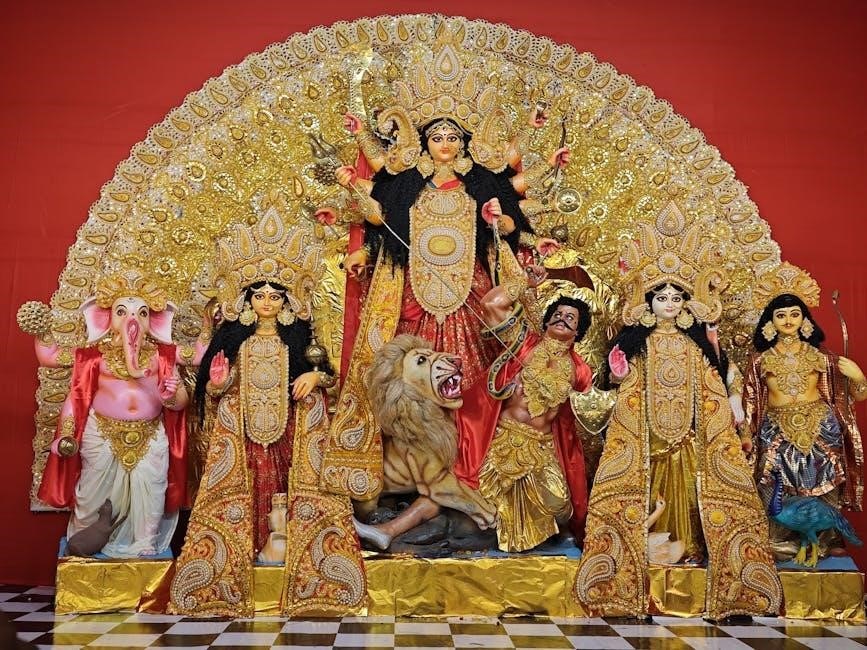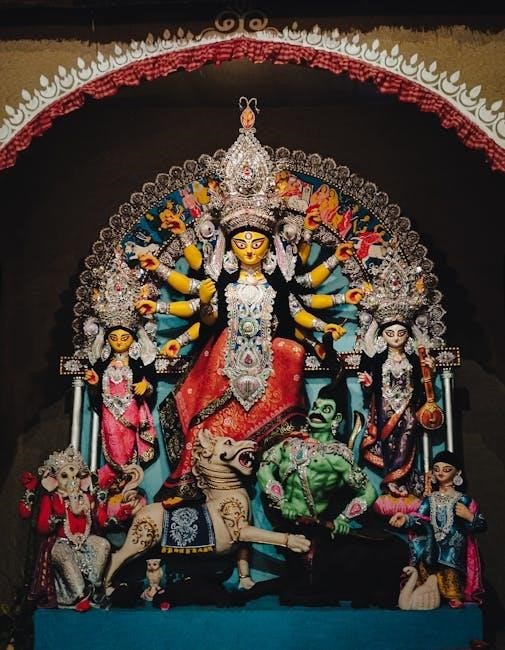
Lakshmi Ashtothram is a revered Hindu hymn dedicated to Goddess Lakshmi, comprising 108 sacred names that embody her divine qualities and blessings for prosperity and wealth.
Overview of Lakshmi Ashtothram
Lakshmi Ashtothram, also known as Sri Lakshmi Ashtottara Shatanamavali, is a sacred Hindu devotional text comprising 108 names of Goddess Lakshmi, the deity of wealth and prosperity. This hymn is deeply revered in Hinduism, offering a poetic and spiritual tribute to the goddess, highlighting her divine attributes and blessings. The Telugu PDF version of Lakshmi Ashtothram is a convenient resource for devotees, providing easy access to the text for recitation and worship. It is structured to facilitate smooth chanting, with each name reflecting a unique aspect of Goddess Lakshmi’s benevolence. The PDF format ensures clarity and portability, making it accessible for daily worship or special occasions. Chanting Lakshmi Ashtothram is believed to bring peace, prosperity, and spiritual fulfillment, making it a cherished practice among devotees seeking divine grace.
Significance of the 108 Names of Goddess Lakshmi
The 108 names of Goddess Lakshmi, as detailed in the Lakshmi Ashtothram, hold profound spiritual and cultural significance. Each name embodies a unique attribute or blessing of the goddess, symbolizing her multifaceted role in bestowing wealth, prosperity, and divine grace. The number 108 is considered sacred in Hinduism, representing completeness and spiritual fulfillment. Chanting these names is believed to bring peace, harmony, and material success, while also fostering a deeper connection with the divine. The Telugu PDF version of Lakshmi Ashtothram simplifies access to this sacred text, making it easier for devotees to recite and meditate on these powerful names. The structure of the Ashtothram ensures that each name is chanted with reverence, emphasizing the importance of completing the full cycle of 108 names to maximize its spiritual benefits and seek Goddess Lakshmi’s blessings.

Structure of Lakshmi Ashtothram
Lakshmi Ashtothram consists of an invocation, 108 divine names of Goddess Lakshmi, and a concluding prayer, structured to ensure a smooth and reverent recitation process, with the Telugu PDF format aiding clarity.
The 108 Names of Goddess Lakshmi
The 108 names of Goddess Lakshmi, as detailed in the Lakshmi Ashtothram, are sacred invocations that highlight her attributes, from granting prosperity and wealth to embodying wisdom and compassion. Each name carries profound spiritual significance, reflecting her role as the remover of obstacles and the bestower of fortune. These names are often recited with devotion, using a japa mala to count each name, ensuring completeness and focus. The Telugu PDF version of Lakshmi Ashtothram presents these names in a clear and accessible format, preserving ancient traditions while making them easy to understand for modern practitioners. Chanting these names is believed to bring peace, prosperity, and spiritual growth, resonating with the essence of Goddess Lakshmi’s divine grace. The structured recitation of these 108 names is a cherished practice, deeply rooted in Hindu spirituality.
Invocation and Recitation Process
The invocation begins with a prayer to Goddess Lakshmi, seeking her divine presence and blessings. Devotees typically start by offering flowers, incense, and lamps, creating a sacred atmosphere for worship. The recitation of Lakshmi Ashtothram is usually performed with a japa mala, a string of 108 prayer beads, which helps in maintaining focus and counting the names accurately. Each name is chanted with devotion and mindfulness, ensuring the full cycle of 108 names is completed without interruption. Fridays are considered the most auspicious days for this practice, as they are dedicated to Goddess Lakshmi. The Telugu PDF version of Lakshmi Ashtothram provides a convenient format for devotees to follow the recitation, ensuring clarity and accessibility. This structured process is believed to enhance spiritual connection and amplify the benefits of chanting, fostering peace, prosperity, and divine grace in the lives of the faithful.
Importance of Completing the Full Cycle of 108 Names
Completing the full cycle of 108 names in Lakshmi Ashtothram is deeply significant, as it symbolizes spiritual completeness and alignment with the divine. The number 108 holds cosmic relevance, representing the universe’s rhythms and humanity’s connection to the divine. Reciting all names ensures the devotion is wholehearted and uninterrupted, amplifying its spiritual impact. Breaking the cycle is believed to diminish the ritual’s efficacy, while completing it fosters a sense of accomplishment and heightened blessings from Goddess Lakshmi. The Telugu PDF version aids devotees in accurately following the sequence, minimizing errors, and maintaining focus. This holistic approach ensures the recitation’s purity and effectiveness, allowing devotees to experience profound peace, prosperity, and spiritual growth. The commitment to completing the full cycle reflects dedication and faith, essential for reaping the mantra’s transformative benefits.

Significance of Chanting Lakshmi Ashtothram
Chanting Lakshmi Ashtothram attracts wealth, ensures peace, and fosters spiritual growth, making it a powerful ritual for devotees seeking prosperity and divine blessings in their lives.
Auspicious Days for Chanting
Fridays are considered highly auspicious for chanting Lakshmi Ashtothram, as they are dedicated to Goddess Lakshmi. Devotees also prefer chanting on birthdays, mantra initiation days, and Poorna Abhishekam days for enhanced blessings. Additionally, festivals like Diwali and Navaratri are ideal times to recite the hymn, as they amplify its spiritual significance. Chanting during these days is believed to attract wealth, peace, and prosperity. Many followers also choose to recite Lakshmi Ashtothram daily, especially during early morning hours, to maintain a consistent connection with the divine energy of Goddess Lakshmi. The key is to focus on genuine devotion and intent, ensuring the chanting is performed with purity of heart and mind.
Benefits of Reciting Lakshmi Ashtothram
Reciting Lakshmi Ashtothram is believed to bring immense blessings, including wealth, prosperity, and peace. It helps remove obstacles, attract positive energy, and grant spiritual growth. Regular chanting is said to enhance financial stability, improve relationships, and foster a sense of calm. Devotees also experience increased confidence and clarity in life decisions. The hymn is particularly beneficial for those seeking relief from debts or hardships. Chanting with sincerity and devotion strengthens one’s connection with Goddess Lakshmi, the embodiment of fortune and abundance. Many followers report feeling a profound sense of inner peace and divine grace after reciting the 108 names. Over time, consistent practice is believed to manifest lasting prosperity and happiness in all aspects of life.
Role of Japa Mala in the Chanting Process
The Japa Mala, or prayer beads, plays a vital role in the recitation of Lakshmi Ashtothram. It serves as a tool to count the 108 names of Goddess Lakshmi, ensuring the devotee completes the entire cycle without interruption. Each bead represents one name, helping the practitioner maintain focus and rhythm during the chant. Using a Japa Mala is believed to enhance concentration and deepen the spiritual connection with the deity. It also symbolizes the eternal and cyclic nature of divine energy. Many devotees consider the mala a sacred object, often energized by the vibrations of the chants. Regular use of the Japa Mala during Lakshmi Ashtothram is said to amplify the benefits of the recitation, bringing peace, prosperity, and divine blessings into one’s life.

The Lakshmi Ashtothram in Telugu PDF is a readily available resource, offering the 108 sacred names of Goddess Lakshmi. It is designed for easy recitation, bringing peace and prosperity to devotees.
Availability of Telugu PDF Version
The Lakshmi Ashtothram in Telugu PDF is widely accessible online, allowing devotees to easily download and use it for daily worship or special occasions. Its digital format ensures convenience, making it possible to access the sacred hymn anytime and anywhere. Many spiritual websites and platforms offer this PDF free of charge, enabling widespread dissemination. Additionally, the PDF is compatible with various devices, including smartphones and tablets, which further enhances its accessibility. This ease of access has made it a popular choice among those seeking to incorporate the chant into their spiritual practices. The availability of the Telugu PDF version has thus simplified the process of connecting with Goddess Lakshmi’s blessings through recitation. This accessibility ensures that the tradition remains alive and vibrant in the digital age.
Features of the Telugu PDF
The Telugu PDF version of Lakshmi Ashtothram is designed to be user-friendly and accessible. It typically features clear, readable fonts and proper formatting, ensuring a seamless recitation experience. Many versions include transliterated text, making it easier for non-Telugu speakers to pronounce and recite the names accurately. Some PDFs also include introductory prayers, invocation mantras, and concluding rituals, providing a comprehensive guide for devotees. Additionally, the PDF may incorporate meaningful explanations or brief interpretations of the 108 names, enhancing spiritual understanding. The layout is often optimized for both digital and print use, allowing devotees to choose their preferred method of recitation. Its portability and readability make it a valuable resource for daily worship or special occasions, ensuring that the sacred hymn remains accessible and inspiring for all who seek Goddess Lakshmi’s blessings.
Downloading and Using the PDF for Chanting
Downloading the Lakshmi Ashtothram in Telugu PDF is a straightforward process, with numerous reliable sources offering free access to the document. Once downloaded, the PDF can be easily accessed on various devices, making it convenient for daily chanting. Many versions are optimized for both online and offline use, ensuring uninterrupted recitation. To enhance the chanting experience, devotees can use the PDF alongside a japa mala to keep track of the 108 names. It is advisable to recite the hymn in a calm and pure environment, ideally on auspicious days like Fridays, to maximize its spiritual benefits. The PDF’s clear formatting and readable text make it an ideal companion for both experienced chanters and newcomers seeking to connect with Goddess Lakshmi’s divine energy.

How to Use the Lakshmi Ashtothram PDF
The Lakshmi Ashtothram PDF is designed for easy access and chanting. It can be downloaded and used on multiple devices, making it ideal for daily worship and spiritual practice.
Step-by-Step Guide to Recitation
Begin by preparing a quiet, clean space for chanting. Open the Lakshmi Ashtothram PDF and familiarize yourself with the Telugu script and pronunciation guides. Start with a brief invocation of Goddess Lakshmi, seeking her blessings. Recite each name slowly, ensuring clarity and focus. Use a japa mala to count the 108 names, maintaining concentration throughout. Pause briefly between names to absorb their significance. Complete the full cycle without interruptions for maximum spiritual benefit. Conclude with a prayer of gratitude to Goddess Lakshmi. Regular practice fosters devotion and enhances the recitation experience, helping to attract prosperity and peace into your life.
Best Practices for Effective Chanting
To ensure the efficacy of Lakshmi Ashtothram chanting, maintain mental focus and concentration throughout the recitation. Choose a serene and sacred space to minimize distractions. Begin with a brief prayer to Goddess Lakshmi, expressing your devotion and intentions. Pronounce each name clearly, adhering to the correct Telugu pronunciation for maximum spiritual impact. Use a japa mala to count the 108 names, helping you stay focused and avoid missing any. Chanting on auspicious days, such as Fridays, is highly recommended for enhanced blessings. Practice regularly to cultivate a deeper connection with the divine energy of Goddess Lakshmi. By following these practices, you can experience the profound benefits of peace, prosperity, and spiritual growth.
Integrating Lakshmi Ashtothram into Daily Worship
Integrating Lakshmi Ashtothram into your daily worship routine can deepen your spiritual practice and foster a sense of devotion. Begin by dedicating a specific time each day, such as early morning or evening, for chanting. Create a sacred space with minimal distractions, ensuring cleanliness and serenity. Offer prayers to Goddess Lakshmi before starting the recitation, expressing gratitude and seeking her blessings. Consistency is key; aim to chant the 108 names regularly to establish a strong spiritual connection. Incorporate the Telugu PDF version into your practice for easy reference and pronunciation guidance. You can also combine the chanting with other rituals, such as lighting a lamp or offering flowers, to enhance the experience. By making Lakshmi Ashtothram a part of your daily worship, you can cultivate a sense of peace, prosperity, and divine grace in your life.

Cultural and Religious Significance
Lakshmi Ashtothram holds profound cultural and religious importance, embodying the divine essence of Goddess Lakshmi. Its 108 names symbolize her universal blessings for prosperity and divine grace.
Lakshmi Ashtothram in Hindu Scripture
Lakshmi Ashtothram is deeply rooted in Hindu scripture, particularly in the Puranas and Vedic texts. It is part of the Sri Lakshmi Ashtottara Shatanamavali, a sacred hymn detailing 108 names of Goddess Lakshmi. These names are derived from ancient scriptures, reflecting her divine attributes as the goddess of wealth, prosperity, and good fortune. The hymn is often referenced in texts like the Padma Purana and Skanda Purana, emphasizing her role as the consort of Lord Vishnu and a symbol of spiritual and material abundance. The 108 names are considered sacred and are frequently recited during pujas and rituals to invoke her blessings. This scriptural significance underscores its importance in Hindu worship, making it a revered text for devotees seeking prosperity and spiritual growth.
Role of Goddess Lakshmi in Hinduism
Goddess Lakshmi is a central deity in Hinduism, revered as the embodiment of wealth, prosperity, and good fortune. She is the consort of Lord Vishnu and plays a pivotal role in maintaining cosmic balance and harmony. Lakshmi is often depicted as the goddess who bestows both material and spiritual wealth, symbolizing abundance and generosity. Her role extends beyond mere prosperity; she is also associated with fertility, beauty, and divine grace. In Hindu scriptures, Lakshmi is celebrated as a nurturing figure who ensures the well-being of her devotees. Her significance is highlighted in various festivals, such as Diwali, where she is worshipped for blessings of wealth and happiness. Additionally, her avatars, like Sita and Rukmini, exemplify her virtues of loyalty and devotion, making her a revered figure in Hindu culture and worship practices.
Cultural Practices Associated with Lakshmi Worship
Lakshmi worship is deeply ingrained in Hindu culture, with various rituals and practices dedicated to invoking her blessings. Devotees often perform puja (worship) on Fridays, considered auspicious for Goddess Lakshmi, where offerings like flowers, sweets, and coins are made. Chanting the Lakshmi Ashtothram, especially during festivals like Diwali, is a common practice to seek prosperity and wealth. Additionally, lighting lamps (diyas) and decorating homes with rangoli (traditional art) are integral parts of Lakshmi worship, symbolizing the welcoming of her divine light. Devotees also observe fasts (vratas) and recite sacred texts like the Lakshmi Sahasranamam to deepen their spiritual connection. These cultural practices not only reflect devotion but also reinforce the values of gratitude and abundance, fostering a sense of harmony and joy within families and communities. The recitation of her 108 names, as in the Lakshmi Ashtothram, further emphasizes her divine attributes and universal appeal.